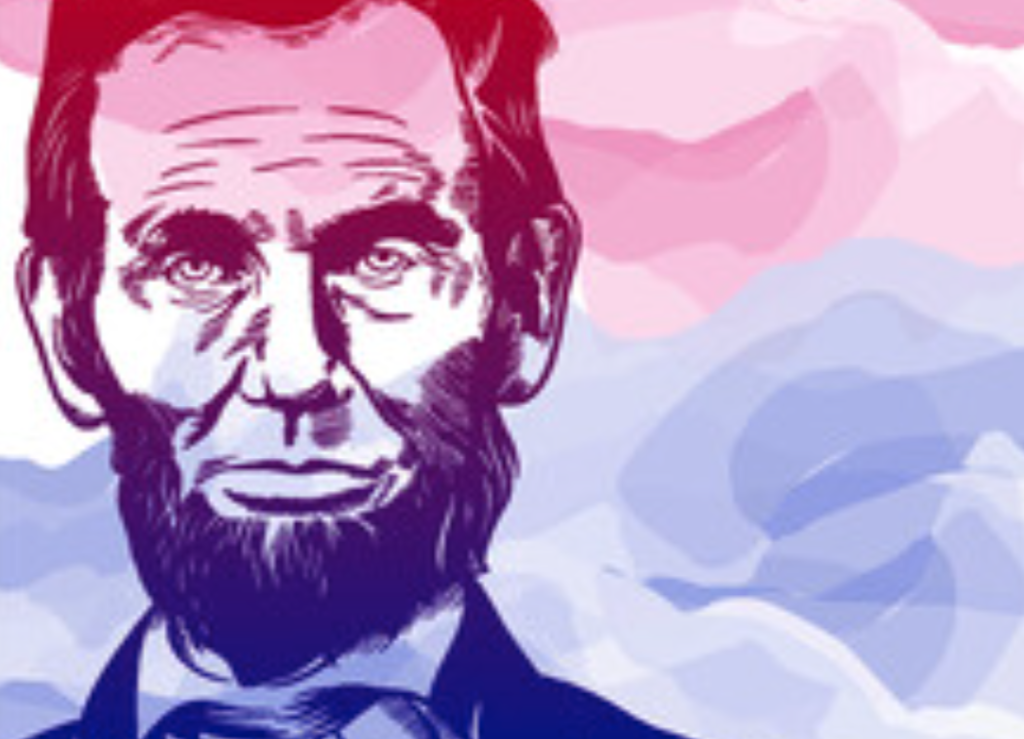

Guelzo’s Lincoln clarifies the moral foundations of democratic patriotism in a corrosive age
Our Ancient Faith: Lincoln, Democracy, and the American Experiment by Allen Guelzo. Knopf, 2024. 272 pp., $30.00
Alexander Stephens befriended Abraham Lincoln in the 1840s, when both were Whig members of the U.S. House of Representatives. They were an unlikely pair: the diminutive Stephens and the gangly Lincoln, one a proslavery Georgian, the other an antislavery Illinoisian. The two remained in touch after their terms in Congress—Stephens to become vice-president of the Confederacy, Lincoln to become President of the United States.
They met again amid failed peace negotiations at the end of the Civil War. Lincoln went out of his way despite their differences to arrange the release of Stephens’s nephew, a prisoner of war held in Ohio. But Stephens, his regard and gratitude for Lincoln notwithstanding, found his erstwhile friend to be exasperating. In a famous quote from 1870, the former secessionist mused that for Lincoln, the mere idea of the Union took on a religious intensity, rising “to the sublimity of a religious mysticism.” Stephens, of course, did not share this belief. But he nevertheless understood something essential about Lincoln.
I kept thinking about Stephens while reading Allen Guelzo’s latest essay collection Our Ancient Faith: Lincoln, Democracy, and the American Experiment. Guelzo is clearly channeling David Donald, whose 1956 book Lincoln Reconsidered remains the gold standard for writing about Lincoln in terms of its insight and clarity. While I’m not sure any other book at this late date could feel as illuminating as that one did in the golden age of academe, this one, with its distilled prose buffed to a glossy sheen, is the product of many years’ reflection. Guelzo offers nine interlaced perspectives with which to view Lincoln’s career, among them economic (the real emphasis here), race, civil liberties, and the like. But what really stands out—the culet at the base of this diamond’s facets—is the strangely spiritual quality that gave Lincoln’s life its purpose and power.
Guelzo, of course, has written extensively about Lincoln, notably in his 1999 book Redeemer President, which sought to view Lincoln not as a product of a particular political culture or a politician articulating a rationale for a legislative program, but rather as a bona fide intellectual seeking to apply the legacy of the Enlightenment in a Victorian age. Like many observers, Guelzo has long noted—as he does in Our Ancient Faith—that Lincoln was no one’s idea of an orthodox Christian: An air of heterodoxy, even sacrilege, hovers over his early life. He never regularly attended church, and while a distinct air of religiosity seeped into his writing over the course of the Civil War (most obviously in his Second Inaugural), his theology was notably lacking when it came to Christology. Lincoln’s real religion was a civil religion: For him, it was republican democracy that was sacred. While its actual practice, like that of all religions, was marked by human fallibility, it nevertheless remained the lodestar by which he judged right, as God gave him to see the right.
And what did God give him to see the light? According to Guelzo, there were two dialectical phenomena that made Lincoln’s faith more than just a matter of willful idiosyncrasy. The first is what Alexis de Tocqueville (who surfaces frequently in Our Ancient Faith in a way he did not in Redeemer President) called mores—“habits, conventions, assumptions, instincts, customs, codes that keep the free individual or a domineering majority from running freely—off the rails or degenerating—into chaos.” One could call this the weight of history. Or, as Lincoln famously did, “public sentiment.” With it, he said, “nothing can fail; without it nothing can succeed.”
But as Guelzo has noted on more than one occasion, Lincoln’s commitment to democracy was not of a populist kind. For instance, in a recent Time article he indicates that Lincoln would have opposed Donald Trump’s actions on January 6, 2021, but as a good party man would accept Trump as Republican nominee if he were to win the GOP primary again. This assertion is less absurd than it first appears when one considers the slaveholding Whigs Lincoln supported in his lifetime, and his avowed acceptance, amid his stated disagreement, of the Dred Scott decision. Still, Lincoln’s affirmation of majority rule was also coupled with a faith that, as he asserted in his famous Cooper Union speech of 1860, “right makes might.”
What is this source of right that operates independently of popular will? Guelzo’s answer: natural law. This, he explained, was a lore of collective wisdom derived from the Enlightenment, Christian thought, and classical philosophy, amounting to an ongoing effort—paralleling that of natural science—to discover the underlying workings of moral order. It was natural law that allowed Lincoln to extrapolate a series of principles that he distilled into his personal credo: “As I would not be a master, I would not be a slave. This expresses my idea of democracy.”
As Guelzo notes, “modern jurisprudence has relegated much of natural law to the historical attic.” The reason for this—one that seems to have reached its apotheosis in recent decades—is a deep-seated skepticism, even hostility, to transcendent ideals, which are now regarded (and taught in schools) as highly contingent historical constructs that function as disguised forms of self-interest. There is no such thing as natural law; there are instead only implacable social forces like racism and patriarchy that amount to the rhetorical tools by which oppressors oppress.
There are some good and real reasons for thinking so. The problem is that deconstruction of ideals can only get you so far. For one thing, the process tends to turn on itself, sowing ontological doubts that can be seized by its opponents. For another, human beings simply cannot function in a moral vacuum. It is of course possible to construct counter-mythologies, but if there’s one thing that the Ibram Kendis of the world have revealed in recent years in their commitment to bureaucratic systems to administer their theories of justice, a deep-seated suspicion of democracy is very unlikely to prevail at the ballot box.
So what will? Can shopworn myths (in the anthropological sense of the term, which is to say propositions whose empirical reality can neither be confirmed nor denied) be forced back into the toothpaste tube of history? Perhaps not. But ours is not the first generation to be faced with cynicism, despair and gross opportunism of the kind purveyed by Donald Trump. American history is a history of revivals, one of which—the Second Great Awakening—happened in Lincoln’s lifetime. Lincoln himself steered clear of its irrational enthusiasms. But the reform energies it unleashed, not the least of which was abolitionism, emerged from evangelical churches and those places we now know as liberal arts colleges, furnishing the loam from which a towering figure grew.
In his recent biography of Robert E. Lee, Guelzo notes that for contemporary Americans the compelling moral issue in Lee’s life and career was his racism. But in the aftermath of the Civil War, it was Lee’s treason—a treason deeply bound up in white supremacy—that concerned contemporaries trying to rebuild a nation dedicated the proposition that all men are created equal. For all its limits and evasions, we would do well to recover a language of love, loyalty and positive virtue—a language of faith—that can recognize and resist the most egregious collective sins. There are times in a culture when the only way forward is back.
Jim Cullen teaches history at the Greenwich Country Day School in Greenwich, Connecticut. He is the author of Bridge & Tunnel Boys: Bruce Springsteen, Billy Joel, and the Metropolitan Sound of the American Century. His 1997 book Born in the U.S.A.: Bruce Springsteen in American Life has just been reissued in a revised and updated third edition.